Please use the following link to download the June 28, 2025 issue of the syəcəb
Kenneth Alan Joseph

AUGUST 12, 1954 – JUNE 23, 2025
Kenneth “KJ” Alan Joseph, a beloved father, grandfather, brother, uncle, and proud Tulalip Tribal member, passed away on June 23, 2025, at the age of 70. He left this world surrounded by the love of his family.
Born in Everett, Washington to Loretta James and Harold Eugene Joseph, KJ was the cherished baby brother in a big, loving family. His roots ran deep—descended from grandparents Lottie Mabel Sampson Henry and Leroy Henry Sr., and Eugene Joseph and Minnie Meander—his life reflected the love, resilience, and humor passed down from his ancestors.
He graduated from Marysville High School, blasting KC & The Sunshine Band and The Beatles. During those years, he journeyed to Hawaiʻi and fell in love with Aloha and he embraced a carefree “hippie life”. His siblings remember their childhood summers with great joy—riding bikes they pieced together from spare parts, swimming all day down at Coy’s dock, camping at Spee-bi-dah during the beach seining days, and laughing until their stomachs hurt.
KJ wore many hats in his life—blackjack dealer, Boeing riveter, carpenter, fisherman, gillnetter skipper, logger, and longtime Tulalip Tribes employee. He served in the Utilities Department, Maintenance Department, and on the Funeral Crew, offering care and service to his community.
He loved to carve cedar, always preferring the raw, unfinished beauty of the wood. He made bentwood boxes, rattles, furniture, and necklaces—things with meaning, made with care, and often given away. He had a green thumb—each year his garden overflowed with tomatoes, potatoes, and sometimes the tallest Mary Jane you’ve ever seen. He was a cook to remember—his frybread was sweet and golden, his chicken strips the best, his chili a comfort, and his strawberry freezer jam unforgettable. His smoked salmon was legendary.
He loved murder mysteries—Dean Koontz and James Patterson were his favorites—and could read three books in a week. And he loved his teams—the Seahawks, the Mariners, and the Sonics—with fierce loyalty. If there was a game on, you could find him watching it with his brother LeRoy, Uncle Stubby, Hanford, Gordy Hawk, or one of his many nephews.
KJ was a proud girl dad. He loved his daughters deeply, and he told them so every time he saw them. He also showed his love through the handmade gifts he adorned them with. His walls were covered with photos of his kids and grandkids—every picture ever given to him, hung with pride like a shrine. He was proud of Jessica’s accomplishments, and he carried that pride close. Chena, his oldest, lived with him and cared for him—she was his steady presence. And he loved his baby girl, Matika, in a way that will never leave her.
His daughters and grandchildren meant the world to him—Dominick, Lukas Alan, Alma Bee, and Kaya Rose. But nothing—nothing—mattered more to KJ than his grandson, “Dom”. The two were inseparable. They watched games together on weekends, talked almost every day, and stood by each other through everything. Dominick was his best friend, his joy, his steady companion—and he was with him at the very end.
He was human. He was complicated. He made mistakes. He carried pain. He also carried love—big, deep, unmistakable love for his kids and grandkids. And even when it was hard, we always knew who he was to us: our dad. Our grandpa. Our brother. Our uncle. Our stubborn, funny, story-filled, deeply loved KJ.
We like to imagine KJ now reunited with his beloved mom, Loretta; his nephews, Michael Lee and Scheiyenne Anthony; and of course, his dog, Ennit. Maybe there’s a game on. Maybe salmon on the smoker. Maybe he’s got a cedar carving in one hand and a book in the other. However it looks, we know it’s peaceful. And we know he’s home.
KJ is survived by his daughters, Chena Joseph, Jessica Joseph, and Matika Wilbur (Lino Manansala); his grandchildren, Dominick (Quinna) Joseph, Lukas Williams, Alma Bee, and Kaya Rose Manansala Wilbur; and his siblings: Marie (Gene) Zackuse, JuJu (Dolly) Joseph, LeRoy (Judy) Joseph, Karen (Cy) Fryberg, Judy (Tony) Gobin, and Carmen (John) Burke. He leaves behind a wide circle of nieces, nephews, cousins, relatives, and friends who will carry his memory forward with love.
A prayer service will be held Thursday, June 26, 2025, at the Tulalip Gathering Hall—dinner at 5pm, service at 6pm. Funeral services will follow on Friday, June 27, at 10am, also at the Tulalip Gathering Hall.
Bring your stories. Bring your laughter. Bring your love. That’s what he would’ve wanted.
A memorial service for Larry will be held on July 17, 2025 at 1:00 pm at Schaefer-Shipman Funeral Home, , with refreshments to follow. Donations in lieu of flowers to the Northwest Parkinson’s Foundation.
Rapid crisis response for Tulalip
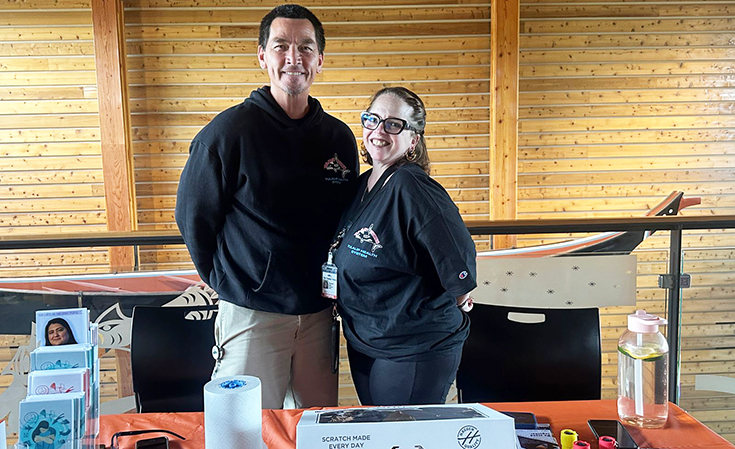
community meet and greet at the Tulalip Admin Building.
By Wade Sheldon, Tulalip News
Launched in April 2024, the Mobile Rapid Response Crisis Team (MRRCT) was created to serve the Tulalip community with timely, culturally responsive behavioral health crisis intervention. The team operates out of Tulalip Family Services. It is available to respond to both mental health emergencies and crises that may not be life-threatening but are still deeply distressing to those experiencing them.
MRRCT includes certified peer counselors, interns working toward licensure, and leadership from Rochelle Long, a Designated Crisis Responder (DCR) and Licensed Mental Health Counselor. As a DCR, Rochelle has the authority to involuntarily commit individuals who are deemed a danger to themselves or others, ensuring immediate safety and stabilization when needed.
Certified peer counselor Michael Stewart explained the team’s mission and the types of situations they respond to. “For crisis, it’s up to the individual—car accidents, death, trouble with family. Whatever you say is a crisis for you is what we are here to support,” he said. “We’re kind of like a bridge to Family Services. If someone doesn’t want to talk right away, we let them know they can come down to start the healing process. We stay with them until they get connected to a counselor.”
The team responds to calls both in person and over the phone. In-person services are available Monday through Friday, 9:30 a.m. to 8:00 p.m., with 24/7 support available via phone. “One of the team members has the phone at all times,” Stewart said. “I was on the phone at 4:50 a.m. the other day with someone in a struggle. We talked through a lot and started helping that individual.”
In the event of a mental health emergency—defined as a life-threatening situation where someone is an immediate danger to themselves or others—the Tulalip Police Department (TPD) should be called at 360-716-9911. For non-life-threatening mental health crises, MRRCT can be reached at 360-502-3365. Community members can also call 988 and select Option 4 for the Native and Strong Lifeline.
According to MRRCT’s program materials, a crisis is when thoughts, feelings, or actions prevent a person from engaging in everyday activities. It can feel overwhelming and may seem like familiar coping skills are no longer working. Crises can happen to anyone, even those without a formal mental health diagnosis.
Examples of when to call MRRCT:
- Suicidal thoughts, with or without a plan or access to weapons
- Homicidal thoughts, with or without a plan or access to weapons
- Active psychosis, including panic attacks or manic behavior
- Voluntary psychiatric hospitalization assistance
- Clinically significant mental health scores, such as moderate to severe PHQ-9/BDI
- Behavioral disruptions at school that prompt police or crisis intervention
- Older adults with dementia symptoms or wandering behaviors
- Frequent 911 callers suspected of having behavioral health needs
- Death or traumatic events, when the family or community requests support
- Suspicious activity calls, where MRRCT can help calm distressed individuals while TPD investigates
- Car accidents, when TPD requests help with de-escalating emotional responses
MRRCT also coordinates detox referrals and support for substance use-related crises in partnership with Tulalip’s Substance Use Disorder (SUD) department, which operates a 24/7 line at 425-754-2535.
The team’s flexibility and reach enable them to respond to a wide variety of situations, from de-escalating an emotional response at a car crash scene to assisting someone in completing a mental health packet and initiating therapy. Their role is not just crisis intervention but walking with individuals through their recovery journey until they are safely connected to the care they need.
Welcoming yubəč
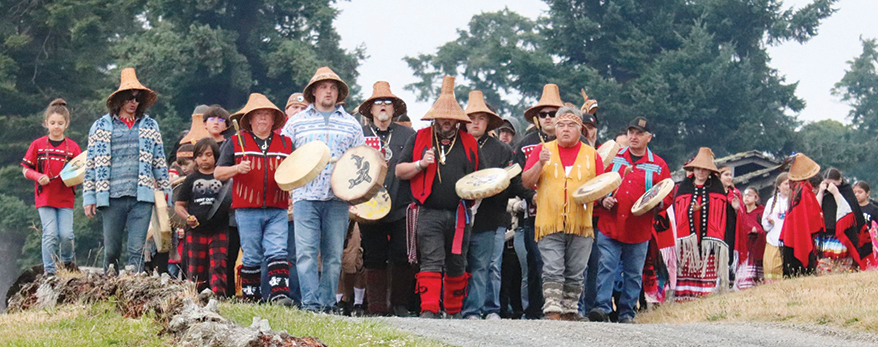
By Wade Sheldon, Tulalip News
Despite a steady breeze and rain throughout the day, the Tulalip Tribes gathered in powerful unity on Saturday, June 21, to welcome the return of the first king salmon to Tulalip Bay. The annual Salmon Ceremony, held at the Tulalip Longhouse, brought together generations of tribal members, clad in traditional regalia and cedar hats, in a vibrant display of cultural pride and ancestral reverence.
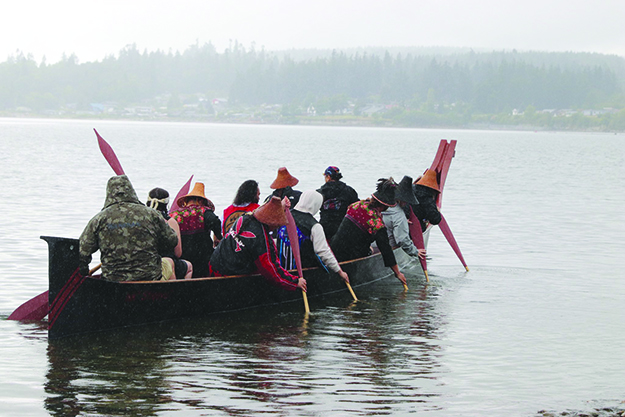

This year’s ceremony was dedicated to the memory of Mason D. Morisset, the Tribes’ longtime fishing rights attorney. Morisset spent more than 50 years fighting to protect tribal fishing grounds through natural resource litigation, winning multiple victories in the U.S. Supreme Court. He worked tirelessly on behalf of tribes across the country to uphold treaty-reserved rights to water, hunting, and fishing. As he once stated, “By law, treaties must be interpreted in favor of the Indians.”
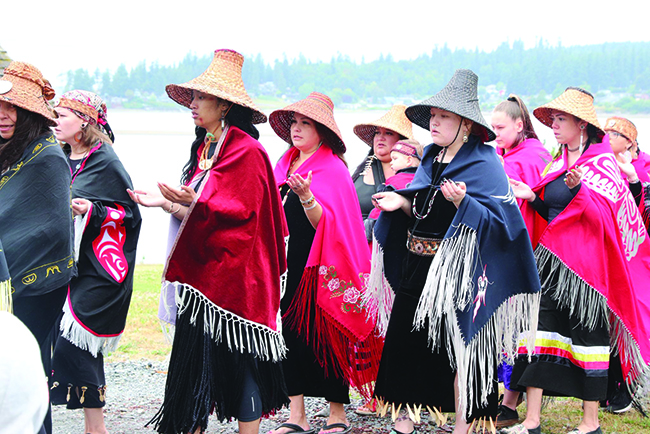
Led by Tulalip Board of Directors Glen Gobin, the ceremony honored the return of the salmon, referred to as “yubəč” the first of the season, and the scout for his people. The fish is welcomed ashore in a traditional canoe and carried to the longhouse on a bed of cedar boughs, where songs, dances, and blessings are shared in its honor.
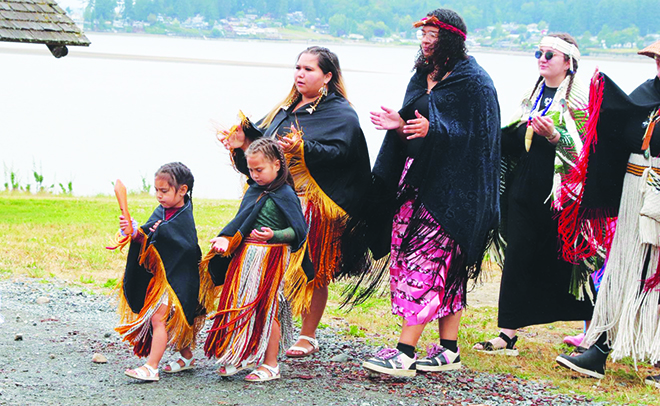
“We are the salmon people,” Glen said. “Today we’re doing this as a people, as a tribe, as a community—honoring and respecting our visitor.” He reflected on how the Salmon Ceremony had nearly been lost due to government efforts to suppress Native traditions, and how it was revived in 1976 by the revered elder Harriet Shelton Dover, alongside other Tulalip elders. The songs and structure were preserved by Stanley G. Jones Sr., who recorded and transcribed the ceremony. Along with Bernie Gobin, the two led the ceremony for many years, ensuring the teachings could be passed down to future generations.

“Before we revived the Salmon Ceremony, it was always a family thing,” Glen explained. “Always a family salmon bake, we’d get everybody together and share the blessing. What we thought was almost lost was being done individually, as a family. Now we do it together.”
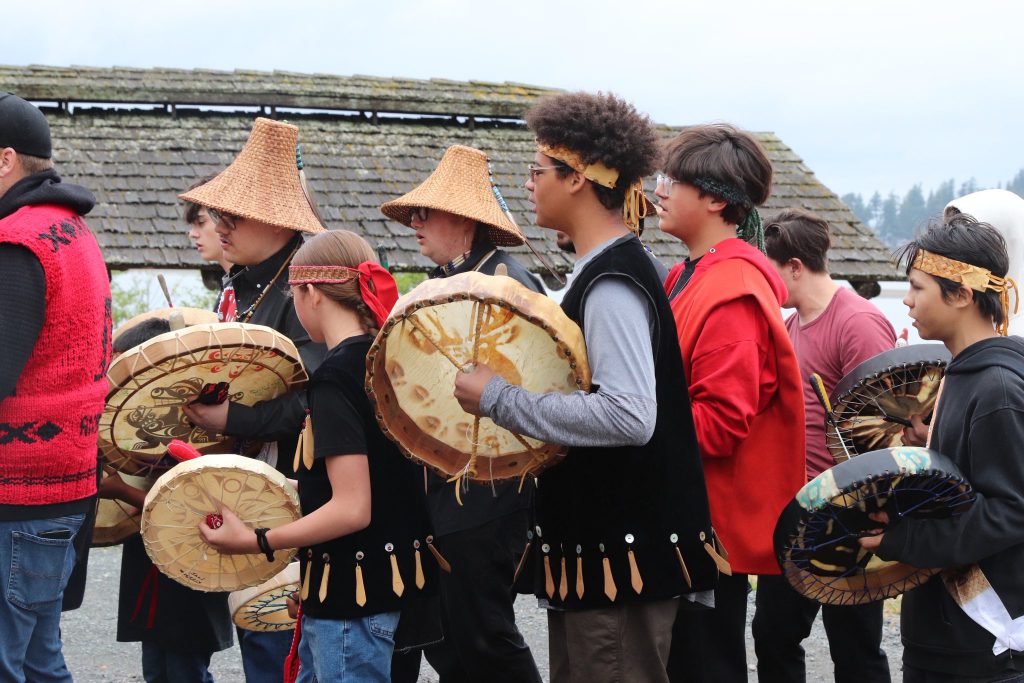
Following the blessing and ceremony at the longhouse, the celebration moved to the Don Hatch Youth Center for a communal feast, where salmon was shared among the people. Afterward, the remains of the visitor were returned to the water on cedar branches, so the salmon could carry word back to his people of the respect he received.
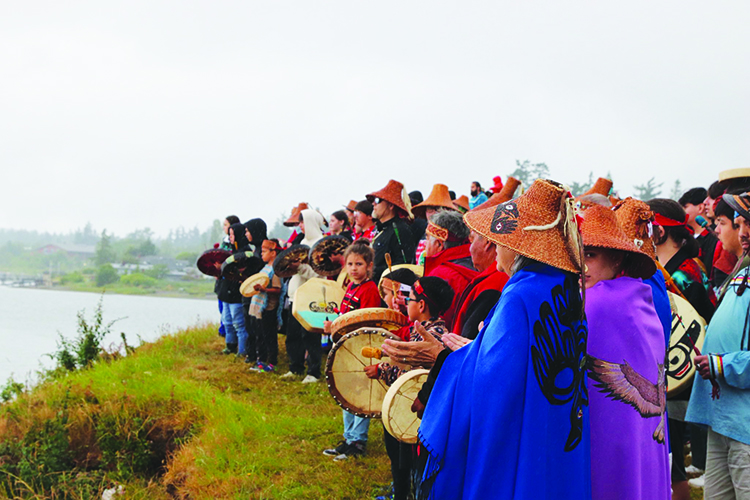
The event saw a remarkable turnout, with hundreds in attendance to witness and participate. Among them was Tulalip tribal member Cam Reyes, who took pride in sharing the day with his family. “It was an excellent event,” Cam said. “It makes me feel really proud to be able to represent and carry on and honor traditions with my family.”
As voices rang out in song and the scent of cedar filled the longhouse, it was clear that the spirit of the ceremony—and the values it teaches—continue to thrive in Tulalip. The return of yubəč each year is more than just a sign of seasonal change; it is a call to remember, respect, and protect the natural gifts that sustain the people.
Children of the Salmon get a taste of tradition
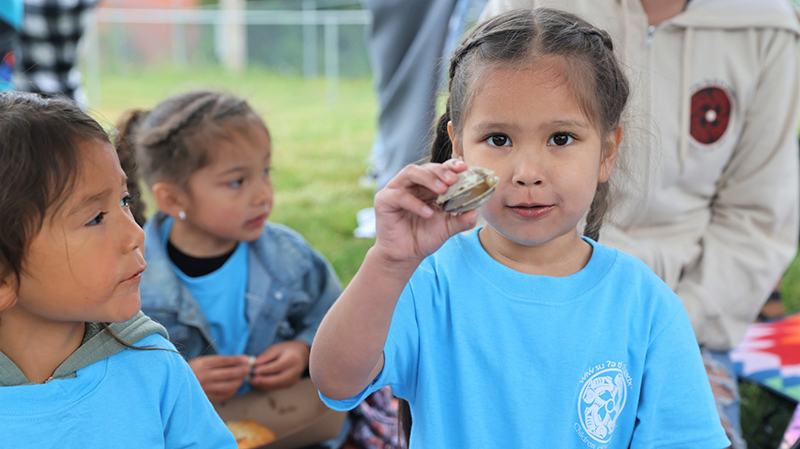
By Micheal Rios, Tulalip News
Giggles galore and the sweet scent of thimbleberries filled the air as the Tulalip Early Learning Academy (TELA) hosted its 4th annual clam bake for this generation’s youngest learners. Nestled a mere block away from the Tulalip Bay shoreline, outside a recently built mock longhouse on TELA’s campus, the academy’s Children of the Salmon got a taste of traditional Coast Salish lifeways.
Designed as a hands-on experience to introduce toddlers and preschoolers to their Coast Salish heritage, the clam bake brought together tribal educators, elders, and families in a memorable celebration of food, identity, and tradition.
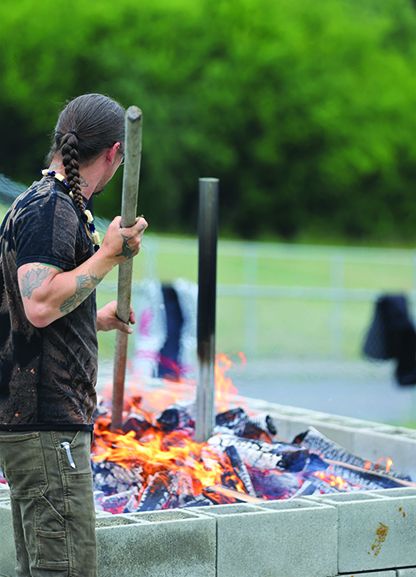
“Today, we just live on a tiny portion of territory, 22,000 square acres, compared to the millions of acres our ancestors controlled pre-treaty. Our leaders of the time signed the treaty, ceding those millions of acres in order to reserve the rights to fish and hunt and gather in our traditional area,” explained Tulalip elder and cultural historian, Ray Fryberg. “Our people used to live all along the water and traveled from village to village via canoe.
“Their paddles were made hard enough and with tips that they would use to dig into the beach and gather clams. They’d take the rocks, heat them up, and create steam to cook those clams. That was our ancestor’s version fast food. They’d use the natural elements of fire, water, and steam to cook their food and nourish their bodies on the go.
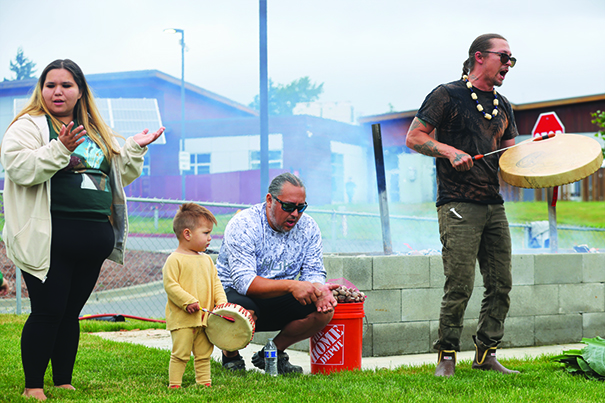
“They didn’t have seasonings, like the salt and pepper, that we have today. Instead, they used locally harvested sprouts to season their food. Today, we’ll be using skunk cabbage leaves and thimbleberry leaves to season the clams. You might smell a sweet aroma from the fire pit. That’s the thimbleberry seasoning the clams.
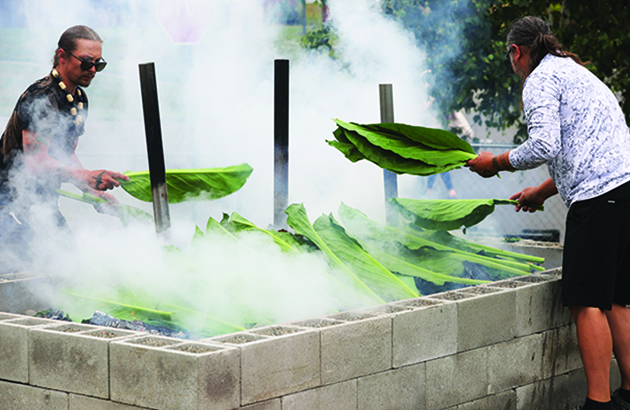
“And so, we’re going to have this clam bake, in a similar way that our ancestors used to cook their food when they traveled in canoes,” continued the venerable elder. “These are our first foods and these are our medicines to keep our bodies healthy. This is what we mean by traditional teachings and we don’t want to let these things get away.”
TELA’s mission to immerse its Children of the Salmon in culturally rich activities and develop strong cultural values and traditions was on full display. This includes the priority to make it completely normal to hear Tulalip’s ancestral language of Lushootseed spoken every day via word learning, fun activities and story time.
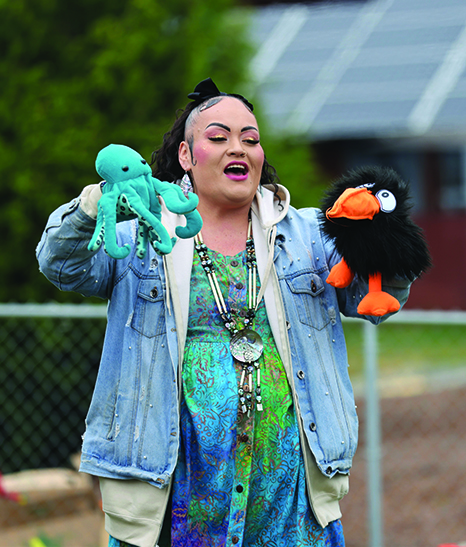
In keeping with teachings from a traditional clam bake, in which Lushootseed would’ve been the primary language, the Tribe’s Language Warriors were on-site sharing songs that many of the kids knew word for word. There were even a few traditional stories shared that kept the children’s attention while the clams were being prepared.
“Here at TELA, our teaching model is rooted in our traditional ways,” said TELA Director Sheryl Fryberg as she watched the anticipation and excitement grow from her Children of the Salmon. “Our teachings aren’t confined to a classroom or a particular book that says you have to remember this or that. Instead, our teachings are taught by active participation and learned experience.
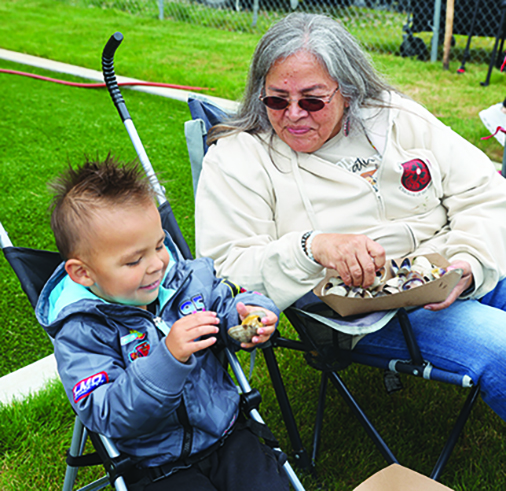
“How do these experiences, like from his clam bake for example, make our children feel? We want them to feel this experience in their spirit so they have confidence and pride in who they are, always,” continued Sheryl. “We understand that as they grow older, they may move away from Tulalip. But having these good, welcoming cultural experiences as a child, they’ll know that Tulalip will always be here for them and for their future children. It’s about planting the seeds so the roots grow.”
Several students couldn’t help but make their way as close as possible to the fire pit, where they watched with wide-eyed wonder as the clams were prepared and placed over hot rocks layered with wet seaweed and large skunk cabbage leaves, and then steamed the old-fashioned way.
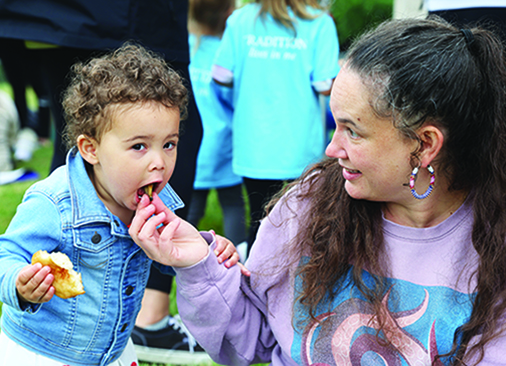
After nearly 20 minutes of steaming and being seasoned in sweet thimbleberry, the clams were ready to eat. The Academy’s students lined up and one by one were served a heaping ladle’s worth of oceanic deliciousness. For some of the students, it was there first time ever eating clams. For others, it was just another day at an all-you-can-eat seafood line. In either case, the clam bake successfully served as an extension of its primary mission by bringing abstract ideas like cultural identifyand traditional teachings into a very tangible and very tasty form.
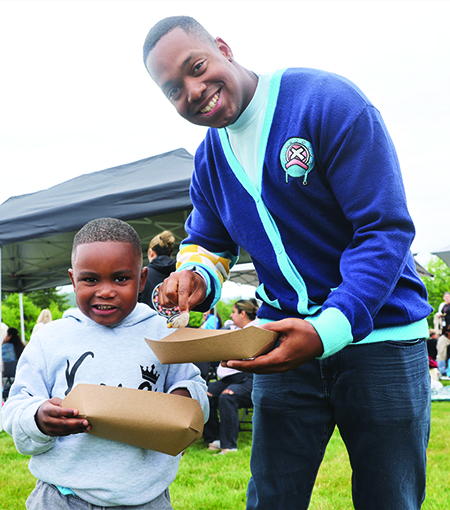
“This right here is everything,” said Lushootseed Language Warrior and lifetime fisherman Thomas Williams, smiling as he watched the children devour their traditional food. Together, with his brother Andy, they manned the fire pit and ensured the clams were steamed to perfection. “When we were growing up, the excitement with food was getting a McDonald’s Happy Meal. Now, here we are, getting that same reaction from kids today with our traditional foods.
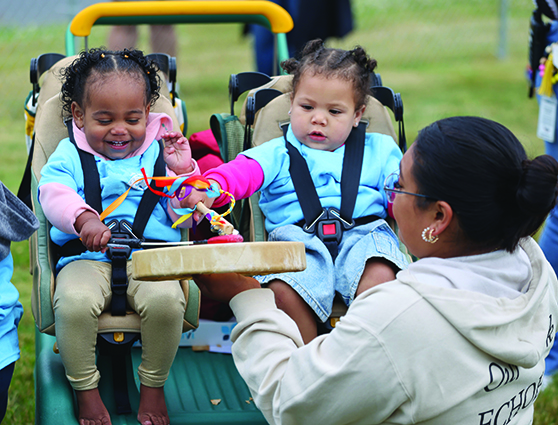
“We hear concepts like food sovereignty, but what does that really mean? For us and these kids, it’s about gathering and harvesting our traditional foods without having to purchase them from a store,” he added. “In order for them to want to learn to gather and harvest, or hunt and fish, they have to like traditional foods, which means introducing them to these foods at an early age. Just look around. Seeing these kids eat these clams and run back into line for more is so encouraging. I’m sure there are future fisherman here. They may not remember this specific moment when they are adults, but they’ll know they like the taste of clams and they’ll embrace that knowledge by harvesting clams or crab or geoduck to feed themselves and their family.”

Planting the seeds early so our Tribe’s children embrace tradition and grow to know who they are and where they come from are ideals both TELA and Lushootseed strive to impart onto the greater Tulalip community. If the clam bake’s success shows us anything, it’s that sometimes all it takes is a taste to ensure tradition lives on.
June 21, 2025 syəcəb
Please use the following link to download the June 21, 2025 issue of the syəcəb
Aiden in the Outfield

By Micheal Rios, Tulalip News
Lakewood High School senior Aiden Jones made sure to leave a lasting impression in his final season wearing Cougar maroon and gold. The powerful right fielder put together a standout year at the plate and in the field, earning second team All-Northwest Conference honors and drawing interest from college programs eager to add his bat to their roster.
“Aiden brings so much to our team. He’s a strong presence in the lineup, in the field, and in the dugout,” said Lakewood head coach Jackson Conn. “His strength is quite literal, he’s a strong kid with a massive arm, but he’s also mentally strong. His leadership, discipline and patience set him apart as a senior and team captain. He’s worked with our team’s underclassmen all year long and been invaluable to us coaches in teaching those on and off the field skills.”
Aiden, known around the league for his smooth right-handed swing and clutch hitting, wrapped up his senior campaign with an impressive .371 batting average and .429 on-base percentage. According to Max Preps, he amassed 23 hits, 22 RBI’s and scored 11 runs to round out one of the most complete offensive seasons in recent Lakewood history.

“I was fortunate to coach Aiden all four years he played at Lakewood. I witnessed his growth and progression from his freshman year to his senior year,” said Coach Conn. “He had so many great games for us, but the moment that stands out most for me as his coach was when he hit his first homerun here at home. He worked so hard in the offseason and really put the time in weight room to pack on lean muscle and take his power to the next level. Then to see all that hard work pay off when he hit that homerun off one of the best pitcher’s in our conference. It looked like he was floating around the bases. He was so excited and the rest of the team was so excited for him.”
From opening day to the team’s final out, Aiden approached every opportunity with composed confidence while serving as the Cougars’ most dangerous hitter. Batting in the cleanup spot, he consistently delivered in key moments, including clutch at bats in rivalry wins over both Sedro-Woolley and Squalicum. Perhaps his most memorable moment, or just his grandparents’ favorite one, was blasting a homerun off his Louisville Slugger Atlas in the final game of the season vs. Lynden.

“Baseball gives you a lot of life lessons,” explained the hard-hitting, 18-year-old Tulalip tribal member. “In this game, you fail a lot more than you succeed. For example, there are Hall of Fame players who averaged 3 for 10 at the plate. This translates to the real world because everyone is waiting for opportunities to succeed, but when those opportunities come, are you prepared to capitalize? And when you strikeout, because we all do, how do you respond to the next opportunity?”
His ability to capitalize on his opportunities by tracking pitches and delivering extra-base hits made him a fixture in the heart of Lakewood’s lineup and a constant threat to opposing pitchers. While his offensive numbers often started conversations, Aiden was just as dependable defensively as an everyday right fielder. He showcased strong range, reliable hands, and a sharp throwing arm, recording multiple assists—including several run-saving throws enroute to a whopping .900 fielding percentage.

“I play with great confidence, regardless of who is pitching or who is at bat,” asserted the six-foot, two-hundred-pound Aiden who is all muscle and pure testosterone. “At the end of the day, this is just a game, but it’s a game I’ve prepared myself to play at the highest level. I lift six days a week in the offseason, hit the batting cages 3 days a week, and spend a couple hours as often as I can studying the greats. I watch film of the best players to study their mechanics and learn from their professional habits.”
Aiden’s complete skill set and strong academic record has started to open doors at the next level. College coaches from across the Northwest and California reached out to him during his stellar senior year. With his high school days now behind him and an entire summer of recruitment opportunities in front of him, Aiden is steadfast on waiting for the perfect pitch before committing his bat to any collegiate program.
Once he commits to a college, he’ll be fulfilling a dream that was manifested nearly two decades ago when a new born Aiden attended his first baseball. His grandparents, Pam and Butch Blount, recall a month’s old Aiden taking in the sights and sounds of the game while cheering on their son Cody, Aiden’s uncle, playing select ball.

“Raising our grandson has been amazing,” said grandmother Pam while rocking a pair of custom-made earrings that have Aiden’s name and jersey number on them. “We’ve shuttled him back and forth from so many practices, games, tournaments and training facilities that it’s impossible to remember a time when he didn’t have baseball in his life. He’s put his whole heart and soul into this game and into becoming the best player he can be.
“Of course, we want him to play college ball somewhere somewhat local so we can continue to watch him play,” she added. “Wherever he decides to go, we know he’ll continue to push himself to be great and to take this game as far as he can take it.”

With his graduation just days in the rearview mirror, Aiden’s high school career comes to a close. He leaves behind a legacy of hard work, big swings, and bigger moments. For Lakewood Cougar’s baseball, #23’s impact won’t soon be forgotten. And for college scouts, the best may be yet to come.
Rez Reads: 2025 Summer Edition

By Kalvin Valdillez, Tulalip News
It’s officially summertime! And it’s time to sit back and unwind with a good book while you catch some rays. With an eventful summer planned at Tulalip, we highly recommend scooping up at least one of these books to check out during your downtime.
This selection is comprised of ten books that range from beautifully written poems, heartbreaking memoirs, romance novels, to thrillers. But no matter the genre, within in the pages of these stories, you will find the authors baring their souls, while sharing their languages and their heritage, as they open up about difficult topics such as generational trauma and navigating today’s colonized society as Native People.
Many of these books were released within the past few weeks, with the exception of the last three, which are set to launch this summer. We have included the book jacket summary for each, so you can get a feel for the story before purchasing. And we are pleased and honored to kick-off this Rez Reads segment with Tulalip’s own, SummerLee Blankenship. Happy reading!

The Greatest Teacher of All by SummerLee Blankenship (Tulalip)
What if your rock bottom was actually the beginning of your rebirth?
In The Greatest Teacher of All, SummerLee Blankenship shares her raw and powerful true story—from addiction, trauma, and deep loss to awakening, healing, and spiritual transformation. As a Native American woman carrying generational pain, she walks the long road home to herself through plant medicine, ceremony, and divine guidance.
This isn’t just a memoir—it’s a testimony of survival, soul reclamation, and the sacred wisdom found in life’s darkest moments. With brutal honesty and poetic grace, SummerLee invites readers into the depths of her journey and shows us that even in our most broken state, we are never beyond redemption.
For anyone who has felt lost, alone, or unloved—this book is your mirror, your medicine, and your reminder that healing is possible.

Blue Corn Tongue: Poems in the Mouth of the Desert by Amber McCray
In a voice that is jubilant, irreverent, sometimes scouring, sometimes heartfelt, and always unmistakably her own, Amber McCrary remaps the deserts of Arizona through the blue corn story of a young Diné woman figuring out love and life with an O’odham man. Reflecting experiences of Indigenous joy, pain, and family, these shapeshifting poems celebrate the love between two Native partners, a love that flourishes alongside the traumas they face in the present and the past. From her ethereal connection with her saguaro muse, Hosh, to the intricate tapestry of her relationships with Diné relatives and her awakening to the complex world of toxic masculinity, McCrary brings together DIY zine aesthetics, life forms of juniper and mountains, and the beauty of Diné Bizaad to tell of the enduring bonds between people and place.
Journeying from the Colorado Plateau to the Sonoran Desert and back again, Blue Corn Tongue invokes the places, plants, and people of Diné Bikéyah and O’odham jeweled in a deeply honest exploration of love, memory, and intimacy confronting the legacy of land violence in these desert homelands

We Can Never Leave by H.E. Edgmon
You can never go home…
Every day, all across the world, inhuman creatures are waking up with no memory of who they are or where they came from–and the Caravan exists to help them. The traveling community is made up of these very creatures and their families who’ve acclimated to this new existence by finding refuge in each other. That is, until the morning five teenage travelers wake to find their community has disappeared overnight.
Those left: a half-human who only just ran back to the Caravan with their tail between their legs, two brothers–one who can’t seem to stay out of trouble and the other who’s never been brave enough to get in it, a venomous girl with blood on her hands and a heart of gold, and the Caravan’s newest addition, a disquieting shadow in the shape of a boy. They’ll have to work together to figure out what happened the night of the disappearance, but each one of the forsaken five is white knuckling their own secrets. And with each truth forced to light, it becomes clear this isn’t really about what happened to their people–it’s about what happened to them.

Bones of a Giant by Brian Thomas Isaac
From the award-winning, bestselling author of All the Quiet Places, comes Brian Thomas Isaac’s highly anticipated, haunting and tender return to the Okanagan Indian Reser.ve and a teenager’s struggle to become a man in a world of racism and hardship.
Summer, 1968. For the first time since his big brother, Eddie, disappeared two years earlier—either a runaway or dead by his own hand—sixteen-year-old Lewis Toma has shaken off some of his grief. His mother, Grace, and her friend Isabel have gone south to the United States to pick fruit to earn the cash Grace needs to put a bathroom and running water into the three-room shack they share on the reserve, leaving Lewis to spend the summer with his cousins, his Uncle Ned and his Aunt Jean in the new house they’ve built on their farm along the Salmon River. Their warm family life is almost enough to counter the pressures he feels as a boy trying to become a man in a place where responsible adult men like his uncle are largely absent, broken by residential school and racism. Everywhere he looks, women are left to carry the load, sometimes with kindness, but often with the bitterness, anger and ferocity of his own mother, who kicked Lewis’s lowlife father, Jimmy, to the curb long ago.
Lewis has vowed never to be like his father—but an encounter with a predatory older woman tests him and he suffers the consequences. Worse, his dad is back in town and scheming on how to use the Indian Act to steal the land Lewis and his mom have been living on. And then, at summer’s end, more shocking revelations shake the family, unleashing a deadly force of anger and frustration.
With so many traps laid around him, how will Lewis find a path to a different future?

Remember, You Are Indigenous: Memories of a Native Childhood by Evelyn Bellanger
A respected elder shares stories. and insights from growing up on the White Earth Reservation in Minnesota
With unflinching honesty, Evelyn Bellanger tells a vivid account of her childhood in Pine Point, Minnesota, and relates her experiences to the networked histories of marginalization and oppression faced by Indigenous people in the United States. As Bellanger connects her later activist work to her early memories, Remember, You Are Indigenous emphasizes the implications of intergenerational trauma as well as the strength of community.
Grounding her narrative in the pre-colonization history of the Anishinaabeg and the environmental damages wrought by land developers, lumber companies, and the U.S. Army Corps of Engineers, Bellanger invites readers into her family’s history, weaving stories of her mother, father, and grandmother into her own. She pays careful attention to the seasonality of life and the natural world as she remembers harvesting wild rice by canoe with her family, and she observes social inequities while recalling her time at the Minnesota Home School for Girls state juvenile facility.
Through stories tragic and humorous, Evelyn Bellanger’s voice shines. Her impressionistic style offers authenticity and intimacy as she describes the early experiences that have shaped her work as a leader and activist.

Old School Indian: A Novel by Aaron John Curtis
A coming-of-middle-age novel about an Ahkwesáhsne man’s reluctant return home and what it takes to heal.
Abe Jacobs is Kanien’kehá:ka from Ahkwesáhsne , as white people say, a Mohawk Indian from the Saint Regis Tribe. At eighteen, Abe left the reservation where he was raised and never looked back.
Now forty-three, Abe is suffering from a rare disease – one his doctors in Miami believe will kill him. Running from his diagnosis and a failing marriage, Abe returns to the Rez, where he’s persuaded to undergo a healing at the hands of his Great Uncle Budge. But Budge – a wry, recovered alcoholic prone to wearing punk T-shirts – isn’t all that convincing. And Abe’s time off the Rez has made him a thorough skeptic.
To heal, Abe will undertake a revelatory journey, confronting the parts of himself he’s hidden ever since he left home and learning to cultivate hope, even at his darkest hour.
Delivered with crackling wit, Old School Indian is a striking exploration of the power and secrets of family, the capacity for healing and catharsis, and the ripple effects of history and culture.

Soft as Bones: A Memoir by Chyana Marie Sage
A poetic memoir as intricately woven as a dreamcatcher about overcoming the pain of generational trauma with the power of traditional healing. In her deeply affecting memoir, Soft as Bones, Chyana Marie Sage shares the pain of growing up with her father: a crack dealer who went to prison for molesting her older sister. She details the shame and guilt she carried for years after her family’s trauma as she went from one dysfunctional relationship to another, from one illegal drug to another. In revisiting her family’s history and weaving in the perspectives of her mother and sisters, Chyana examines the legacy of generational abuse, which began with her father’s father, who was forcibly removed from his family by the residential schools and Sixties Scoops programs.
Yet hers is also a story of hope, as it was the traditions of her people that saved her life. In candid, incisive, and delicate prose, Chyana braids personal narrative with Cree stories and ceremonies, all as a means of healing one small piece of the mosaic that makes up the dark past of colonialism shared by Indigenous people throughout Turtle Island.

Nothing More of this Land: Community, Power, and the Search for Indigenous Identity by Joseph Lee Release Date: July 15
From award-winning journalist Joseph Lee, a sweeping, personal exploration of Indigenous identity and the challenges facing Indigenous people around the world.
Before Martha’s Vineyard became one of the most iconic vacation destinations in the country, it was home to the Wampanoag people. Today, as tourists flock to the idyllic beaches, the island has become increasingly unaffordable for tribal members, with nearly three-quarters now living off-island. Growing up Aquinnah Wampanoag, journalist Joseph Lee grappled with what this situation meant for his tribe, how the community can continue to grow, and more broadly, what it means to be Indigenous.
In Nothing More of This Land, Lee weaves his own story and that of his family into a panoramic narrative of Indigenous life around the world. He takes us from the beaches of Martha’s Vineyard to the icy Alaskan tundra, the smoky forests of Northern California to the halls of the United Nations, and beyond. Along the way he meets activists fighting to protect their land, families clashing with their own tribal leaders, and communities working to reclaim tradition.
Together, these stories reject stereotypes to show the diversity of Indigenous people today and chart a way past the stubborn legacy of colonialism.

Love is a War Song by Danica Nava
Release Date July 22
A Muscogee pop star and a cowboy who couldn’t be more different come together to strike a deal in this new romantic comedy by Danica Nava, USA Today bestselling author of The Truth According to Ember.
Pop singer Avery Fox has become a national joke after posing scantily clad on the cover of Rolling Stone in a feather warbonnet. What was meant to be a statement of her success as a Native American singer has turned her into a social pariah and dubbed her a fake. With threats coming from every direction and her career at a standstill, she escapes to her estranged grandmother Lottie’s ranch in Oklahoma. Living on the rez is new to Avery—not only does she have to work in the blazing summer heat to earn her keep, but the man who runs Lottie’s horse ranch despises her and wants her gone.
Red Fox Ranch has been home to Lucas Iron Eyes since he was sixteen years old. He has lived by three rules to keep himself out of trouble: 1) preserve the culture, 2) respect the horses, and 3) stick to himself. When he is tasked with picking up Lottie’s granddaughter at the bus station, the last person he expected to see is the Avery Fox. Lucas can’t stand what she represents, but when he’s forced to work with her on the ranch, he can’t get her out of his sight—or his head. He reminds himself to keep to his rules, especially after he finds out the ranch is under threat of being shut down.
It’s clear Avery doesn’t belong here, but they form a tentative truce and make a deal: Avery will help raise funds to save the ranch, and in exchange, Lucas will show her what it really means to be an Indian. It’s purely transactional, absolutely no horsing around…but where’s the fun in that?
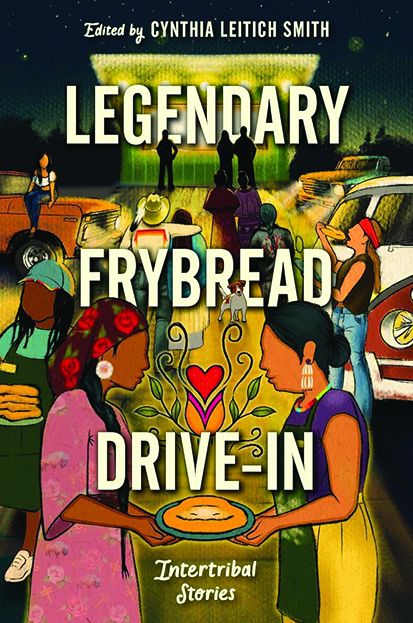
Legendary Frybread Drive-In: InterTribal Stories by Various Authors
Release Date: August 26
Featuring the voices of both new and acclaimed Indigenous writers and edited by bestselling Muscogee author Cynthia Leitich Smith, this collection of interconnected stories serves up laughter, love, Native pride, and the world’s best frybread.
The road to Sandy June’s Legendary Frybread Drive-In slips through every rez and alongside every urban Native hangout. The menu offers a rotating feast, including traditional eats and tasty snacks. But Sandy June’s serves up more than food: it hosts live music, movie nights, unexpected family reunions, love long lost, and love found again.
That big green-and-gold neon sign beckons to teens of every tribal Nation, often when they need it most.
Featuring stories and poems by: Kaua Mahoe Adams, Marcella Bell, Angeline Boulley, K. A. Cobell, A. J. Eversole, Jen Ferguson, Eric Gansworth, Byron Graves, Kate Hart, Christine Hartman Derr, Karina Iceberg, Cheryl Isaacs, Darcie Little Badger, David A. Robertson, Andrea L. Rogers, Cynthia Leitich Smith, and Brian Young.
Royals stun Jetts with last-second touchdown in thrilling playoff battle

By Wade Sheldon, Tulalip News
A warm and golden summer evening set the perfect stage for semi-pro playoff football at Quil Ceda Stadium on Saturday, June 14, as the Everett Royals clashed with the Federal Way-based King County Jetts. Over 60 fans filled the bleachers under the Marysville-Pilchuck sunset, cheering for a game packed with grit, heart, and late-game heroics.
The game opened with nerves on both sides. The Royals fumbled on their first possession, handing the Jetts early momentum. What followed was a defensive slugfest, featuring a staggering six total turnovers in the first half alone. The Jetts finally broke through to take a 6-0 lead—one they carried into halftime as both offenses struggled to find rhythm.

Tulalip Tribal member #16, Timothy Hill Thomas, made an early impact, recovering a fumble and recording a pair of first-quarter tackles to help keep the Royals within reach. Fellow tribal member #56, David Enick, contributed with a couple of assisted tackles leading to stops on downs.
After a slow offensive start, the Royals began to show life in the second half. A deep 45-yard touchdown strike tied the game at 6-6 midway through the third quarter. Despite multiple quarterback changes, Everett’s offense started clicking, capitalizing on a key turnover with short, smart passes to grab a 12-6 lead early in the fourth quarter.

The Jetts weren’t done yet. With just 25 seconds remaining, they pulled off a miraculous 30-yard touchdown catch to knot the score at 12 apiece, setting up what seemed like an inevitable overtime showdown.
But the Royals’ return man #23 had other plans.
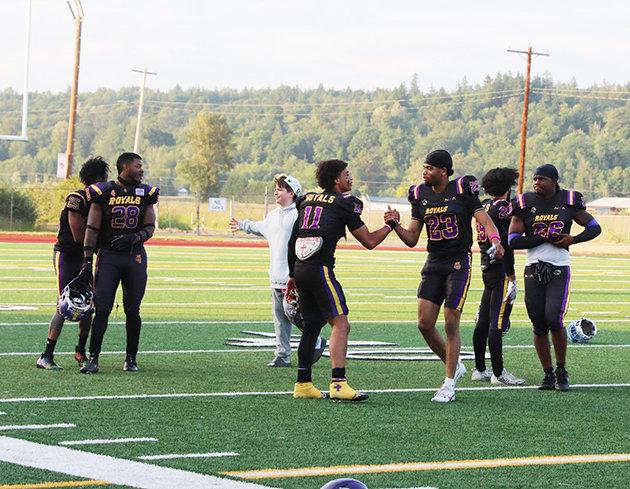
Fielding the ensuing kickoff, he sprinted 75 yards to the house, bursting through multiple tackles. The Royals’ bench erupted, waving goodbye to the stunned Jetts as their season faded with just 15 seconds left. Everett’s defense sealed the deal on the final possession, securing the 18-12 victory in dramatic fashion.
After the game, Royals head coach Boyd Demus reflected on the hard-fought win. “We could have played way better,” he admitted. “It was a hard fight, but we came out with the win. The defense gets an A, the offense pulled it together in the second half, so I’d give them a B. Overall, I’d say it was a B+ effort from my guys. All the hard work paid off.”

Looking ahead to next week’s playoff showdown, Demus acknowledged the challenge ahead. “We face the undefeated Grit City Knights again. Last time we held them until the fourth and just ran out of gas. This time, we’re healthy and ready. We’re looking forward to this match.”
Linebacker Timothy Hill Thomas shared his excitement about advancing. “It feels good to be playing again,” he said. “It’s been a long time. I held it down and we got the dub. We’re ready for what’s next.”
Defensive tackle David Enick added, “I had lots of fun out there. It was awesome. I can’t wait for next week—we face the undefeated team and I think we’ve got them this time.”
The Royals now prepare for their rematch against the formidable Grit City Knights at Franklin Pierce Stadium on Saturday, June 21, at 5:30 p.m. With confidence surging and momentum on their side, Everett will look to dethrone the unbeaten powerhouse and punch their ticket to the championship.
June 14, 2025 syəcəb
Please use the following link to download the June 14, 2025 issue of the syəcəb